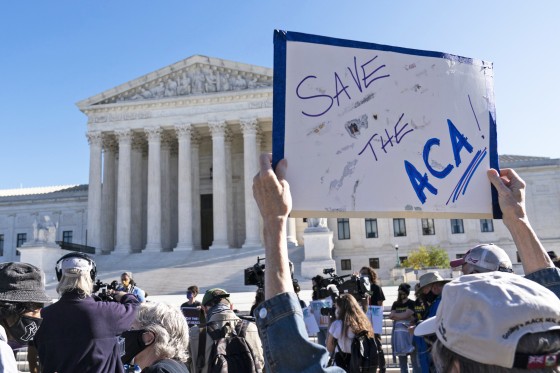On Tuesday, the Supreme Court heard arguments in a case that could determine the fate of the Affordable Care Act. The latest challenge to the legality of the ACA, which comes via Texas, confronts two main legal questions. First, is the so-called individual mandate, which requires most Americans to purchase health insurance, legal? And second, if it is not, should the entire ACA be declared invalid?
Based on oral arguments, it appears likely that at least a majority of the court will not strike the down entire ACA.
Based on oral arguments, it appears likely that at least a majority of the court does not wish to strike down the entire ACA. But we should not have to wish, hope or pray that the court does the legally correct thing and upholds what has become known as Obamacare. No matter how the court rules, likely in the spring or early summer, it should not be up to this group of justices to ensure that Americans have health care coverage. This is our elected officials' responsibility. Here's looking at you, Congress.
In 2010, Congress passed — and President Barack Obama signed — a sweeping health care law that expanded access to affordable health care coverage for Americans, in part by doing things like allowing adult children to stay on their parents' health insurance and expanding the federal Medicaid program. This was perhaps the crowning legislative achievement of the Obama administration, and Republicans immediately challenged its legality. But in 2012, a divided Supreme Court upheld the ACA. This is one of the first and most visible instances in which Chief Justice John Roberts voted with the liberal wing of the court.
Republicans have focused their recent legal challenges on the ACA's individual mandate, which requires that almost all Americans purchase a minimum amount of health insurance coverage. Republicans argued that the individual mandate was an improper exercise of congressional power. Under the individual mandate, Americans who did not purchase insurance faced monetary penalties of almost $700.
The court upheld the individual mandate as valid in 2012 under Congress' taxation authority. But in 2017, Congress reduced the penalty under the individual mandate to $0 as part of larger tax reform legislation. Republicans have long viewed the ACA, and the individual mandate, specifically, with hostility. As of last year, when the change went into effect, there are no financial penalties for failing to purchase health insurance and adhering to the individual mandate. But if the individual mandate is legal only because it is a tax and if Congress takes away that penalty, is the individual mandate still legal?
Texas, other states and individual plaintiffs sued in federal district court in Texas to have not just the individual mandate but the entire ACA declared unconstitutional. The district court agreed on both counts. After the case was appealed to the 5th U.S. Circuit Court of Appeals, the panel agreed 2 to 1 with the district court that the individual mandate is unconstitutional, but it asked that the district court re-review its conclusion that the entire ACA must fall as a result.
California, other Democratic-controlled states and the House of Representatives are now defending the constitutionality of the ACA.
At this point, it seems clear that the individual mandate provision can and should be severed from the rest of the ACA. After all, the mandate has essentially been inoperable since last year. But even if the individual mandate is legally invalid, that doesn't necessarily mean the entire ACA is invalid.
Just last term, the court weighed in on severability and concluded that when part of a law is invalid, the rest of the statutory scheme can stand. The court considered the legality of having a director of the Consumer Financial Protection Bureau, or CFPB, who could be removed by the president at will. The court concluded that the president must have the ability to fire the director at will, but it let the rest of the statute that created the agency remain intact. Then, Roberts explained that the severability doctrine is "a scalpel rather than a bulldozer." However, in the 2012 case upholding the ACA, the court concluded that the individual mandate was an "essential" part of the ACA.
The court should follow the path it took in the CFPB case and let the rest of the ACA stand if it declares the individual mandate unconstitutional. If we are to trust the justices' comments in oral arguments Tuesday, it appears that at least a majority of the court is inclined to strike down the individual mandate but uphold the rest of the statute.
This would respect Congress' intent and cause as little disruption as possible, particularly in the middle of a pandemic. If the court declares the entire health care legislation invalid, it would likely cause significant disruption for tens of millions of Americans.
But again, we should not even be in this mess. The question before the Supreme Court is not whether Congress has the power under the Constitution to create a health care law; it is whether this particular health care law is valid, given Congress' decision to zero out the penalty Americans would pay for failing to purchase health care.
It is time for our elected officials to do their jobs and write — and pass — a law that will ensure that Americans have access to health care. The American public should not depend on five votes to safeguard its access to fair medical care.



